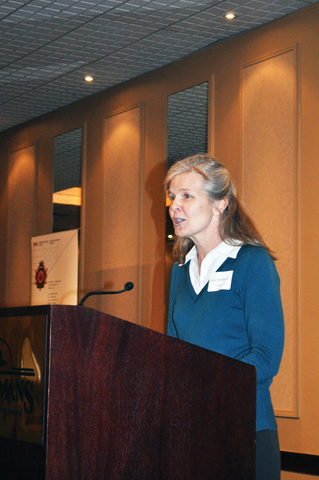

FROM PRISON TO A PLACE CALLED HOME
Many women feel safer in prison than they do in the community
Many women feel safer in prison than they do in the community
For News Tips & Advertising call...
Kitchener East - 519-578-8228
Kitchener West - 519-741-5892
 By Carrie Debrone
By Carrie DebroneKitchener Citizen
Standing in front of 220 people to openly tell her personal story of serving time in jail took courage, but it was not nearly as frightening as trying to find a home after she was released.
Georgina Poirier, a 40-year old Cambridge women who served a three year sentence at Grand Valley Institute for Women in Kitchener for drug dealing, was the keynote speaker at this year’s day-long Annual Forum for Federally Sentenced Women held Jan. 25 at Bingeman’s. The forum was presented by Lutherwood, Grand Valley Institution for Women, Waterloo Regional Housing, Community Justice Initiatives, The Working Centre, Waterloo Region Crime Prevention Council and community volunteers.
This year’s theme, From Prison to a Place Called Home, addressed the housing needs and options for women leaving prison. In this region, far more attention is paid to helping released women with mental health issues or finding them employment than is paid to housing.
“You don’t just get out and find a home. Any woman who has been incarcerated and then released can tell you it’s not quite that simple,” said David Dick, Warden at Grand Valley Institute for Women (GVI).
Finding housing after release from prison remains a big problem. There is no halfway house in Waterloo region so many women are forced to start their reintegration in another city, where they don’t know anyone and where they are far away from their family.
Many end up living in boarding or transition houses where many other tenants may be substance abusers or criminals.
Christine McCardell, a Community Parole Officer, told the crowd that the women in jail realize the struggle they will face on the other side of the prison walls and that she has often seen women cry when they are released.
“It’s easier at Grand Valley Institute. You don’t have to worry about housing, paying bills or buying food,” Poirier said.
“When I got out I was very stressed and it was a very frightening time for me. I felt very alone. When you get out you are faced with so many struggles and to pick your head up and stride forward is really difficult. When I was released I was virtually homeless,” Poirier said.
Add to that the fact that most people released from prison have few friends (and don’t want to - or are trying not to - associate with the friends they had before (because in many cases that’s how they got involved with criminal activity), likely will have a much harder time than others finding a job, and may be
ostracized by their families, and there is a very great chance that they will reoffend
and end up back in prison.
“It’s nearly impossible to make it after prison. I was scared. I had no friends to talk with and most of my family lived far away,” Poirier said.
She explained that the system sets up released women for failure by requiring that they have a home before they qualify for social assistance, but they cannot get a home without a job.
Shannon Steward, Manager of Investigations, Office of the Correctional Investigator agrees.
“Finding housing is likely the greatest challenge facing women who are released from prison,” she told the forum crowd.
Poirier said that although there are many agencies and local organizations that can help former prisoners find housing, they all have strict, individual regulations and criteria that must be met in order to get that help.
“The rules must be followed. There’s no flexibility,” she said, adding that agencies don’t look at each case individually and consider the needs and circumstances of each woman, which are, of course, all different.
“Agencies really need to have the ability to make exceptions, based on what a person needs,” she said.
While attempting to gain custody of her children, Poirier’s story of how she tried desperately to navigate the maze of agency rules and restrictions regarding housing so she could meet the regulations for an apartment large enough to allow her to have her children stay with her for weekend visits, was heartbreaking.
The only two-bedroom apartment she could afford had a drug dealer living next door, rotten walls and was eventually condemned.
Eventually hired by a landscaping company, she later found a better rental unit, but could not scrape together the necessary first and last month’s rent. She approached the “rent bank” offered by Lutherwood. The Rent Bank Program can assist tenants who have short-term rental arrears due to an emergency or other unforeseen circumstance and are facing eviction for non-payment of rent.
“I wasn’t looking for a hand out. I was just looking for help for one month so I could pay the first and last month’s rent,” Poirier said, but explained that because of rent bank’s strict criteria, she did not qualify for any financial help.
“I was told that if I was to lie and say that I had a roommate helping to pay the rent then they could have helped me. I didn’t feel I should have to lie just to get help,” she said.
The only way she was able to keep the unit and pay off past debts was through the generosity of the man who eventually became her husband. He loaned her the money.
Poirier admitted that she still lives with the guilt and shame of her crime and continues to work with her family through the issues related to her time served in prison, but she is proud that she now has custody of her teenage son and daughter, has a job and is the owner of a home with a “dream kitchen and master bedroom.”
Many of the forum’s panel speakers, both former and current GVI residents, praised the Community Justice Initiatives Stride program for helping them get back on their feet after release from prison.
The program, which is run by volunteers, gives released women “circles” of people who are willing to help them in every aspect of their life after prison – including finding housing. They also help women find jobs, figure out bus routes, visits with parole officers and meetings with their children.
Speaker Lydia Vandjelovic, now a member of a Stride circle said she got involved with the program after reaching out to help prisoners through her church.
“I had gone into the prison to help these women but I came out with so much more,” she said.
When told about a women who would soon be released and not only didn’t have an apartment but had nothing to furnish one with she went to her church congregation for donations and collected household items and furniture, including a bed, and stored the items in her garage until the woman was released and eventually found a basement apartment.
“When I told the woman she burst out crying. That was one of the most rewarding things in my life,” Vandjelovic said.
“I encourage everyone to reach out and make a difference,” she said.
Claudette Power, a landlord in Woodstock, currently rents an apartment to a woman who served time in jail for drunk driving and was released last year.
“I told her that I believe in second chances. She told me she had been in jail and her honesty meant a lot to me.”
“I’m a mother of five and I’m willing to give people a chance. I know there were times in my life when I definitely needed a second chance,” Power said.
Power said she called the released women’s references and talked to her probation officer, who all recommended the potential tenant.
“She’s been a fabulous tenant. She pays her rent on time. She’s like a sister to me. I have no regrets at all,” Power said.
Lynne, who rents from Power, said she took a risk by telling Power the truth about being in jail, but said “I was done with the lying.”
“I almost started to cry when she said she would rent to me,” Lynne said.
Lydia Vandjelovic, a member of a Community Justice Initiatives Stride circle that supports women released from prison.